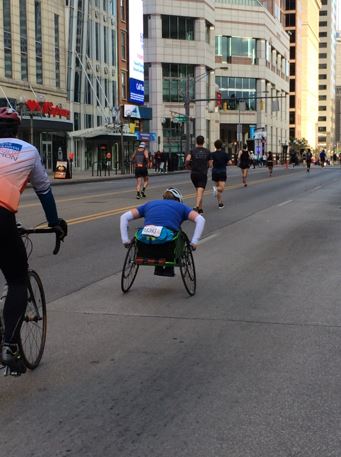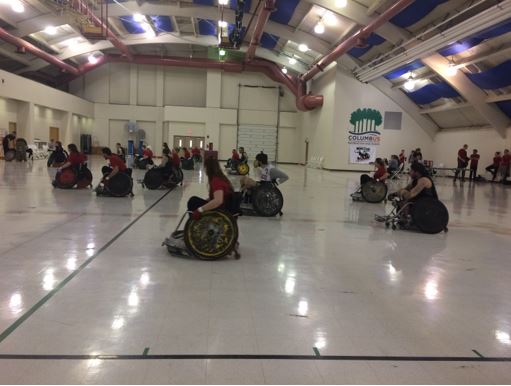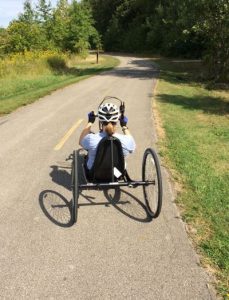Staying Active and Connecting to Your Sports Community Online By Sarah Werner
The pandemic has made it more difficult for everyone to get adequate exercise. This lack is most acutely felt by people with disabilities who are at a higher risk for complications from COVID-19 than other groups, making returning to the gym or to group exercise more dangerous. The warm summer weather is great for people who participate in solitary outdoor sports like handcycling and wheelchair racing. It’s harder if your usual mode of exercise is with a group class, at the gym, or playing a team sport. And even the solitary sports can get lonely without connection to fellow athletes. Fortunately there are lots of ways to stay active by engaging with an online community in whatever sport or mode of workout you love. Connecting online can also help you develop new skills in your sport or learn how to repair or spruce up your equipment while you have extra time on your hands. With more people working and attending school online, the world of sport has moved into the virtual world more than ever as well.
One of the best ways to be encouraged to stay active is by being part of an online community of similar athletes, whether it’s wheelchair racing, wheelchair basketball, or handcycling. Facebook is full of such groups, offering tutorials, online training sessions via Zoom, and informative conversation about the sport. There are groups of handcyclists and wheelchair racers who get together once a week to practice on indoor rollers and give encouragement to each other. In a recent search I found over a dozen Facebook groups dedicated to wheelchair racing and about ten groups for handcycling. There are also several groups for wheelchair basketball players and quad rugby enthusiasts. These are forums where athletes can share their accomplishments, questions and sorrows about practicing their sport during the pandemic.
Another option for wheelchair racers is taking part in virtual races. Most road races have been canceled or moved online, and this includes wheelchair divisions. The Falmouth Road Race, for example, has a whole host of online activities and goodies just for wheelchair participants before and during their August 23rd race. Signing up for a virtual race gives you the same motivation to reach a training goal by a particular date as participating in an actual race would, and it also gives athletes the chance to socialize via Zoom meetups beforehand as well as a live feed during the race if the organizer offers that. Participants also usually still get the t-shirt and coupons that normally come with signing up for a race.

Another great opportunity for athletes is to register for the Angel City Virtual Games, happening for three one-week periods starting July 13 and ending August 30. Elite athletes and coaches from 11 sports will be offering training sessions and resources for their sport, including swimming, track and field, tennis, basketball, judo and goalball. Each week will feature challenges that registered participants can take part in as well as live-streamed virtual workouts. It will also feature community building activities and virtual concerts, mimicking the actual experience of the games as much as possible.
A related option is to sign up for a virtual camp geared towards your particular sport. The University of Illinois recorded sessions from all of their virtual camps and made them available on their website for those who weren’t able to participate live. They have a series of video tutorials for each of their two sports camps, wheelchair track and wheelchair basketball, which include advice on proper technique as well as workouts you can do as you watch the videos. They are taught by the college coaches at University of Illinois and include footage from games and races to help demonstrate proper technique.
You can also spice up your personal workout at home with advice and videos from top athletes. Paralympic champion wheelchair racer Tatyana McFadden has a great upper body workout that anyone can try no matter your sport of choice. If you’re missing your group exercise class, there are some good resources on YouTube. The Shepherd Center in Atlanta has an entire YouTube page of workout resources, including cardio, core stability, and deep breathing. Individuals also share their own home cardio routines with minimal equipment necessary, like this one.
If you’re looking to use this time at home to hone your technique or learn new skills, there are a lot of online resources available from leaders in the sport. World-renowned wheelchair racing athlete Daniel Romanchuk is doing how-to posts on Facebook for wheelchair racers. His tutorials so far have covered tuning your track compensator, steering, retreading pushrims, and how to select the right tires.
Watching historic games is another good way to pick up tips in team sports like wheelchair basketball and quad rugby. Finals matches for both of these sports from both the 2012 London Olympic Games and 2016 Rio Games are available in full on YouTube so you can have a chance to learn from the best of the best athletes from all over the world.

No matter what sport you love or if you only workout to keep up your cardiovascular health, there are a bounty of resources online to help you set and accomplish your fitness goals. All signs seem to indicate that the pandemic will be disrupting many aspects of our lives for months to come, and staying healthy is one of the best ways to prevent disease and keep up your spirit during these uniquely challenging times.












You must be logged in to post a comment.